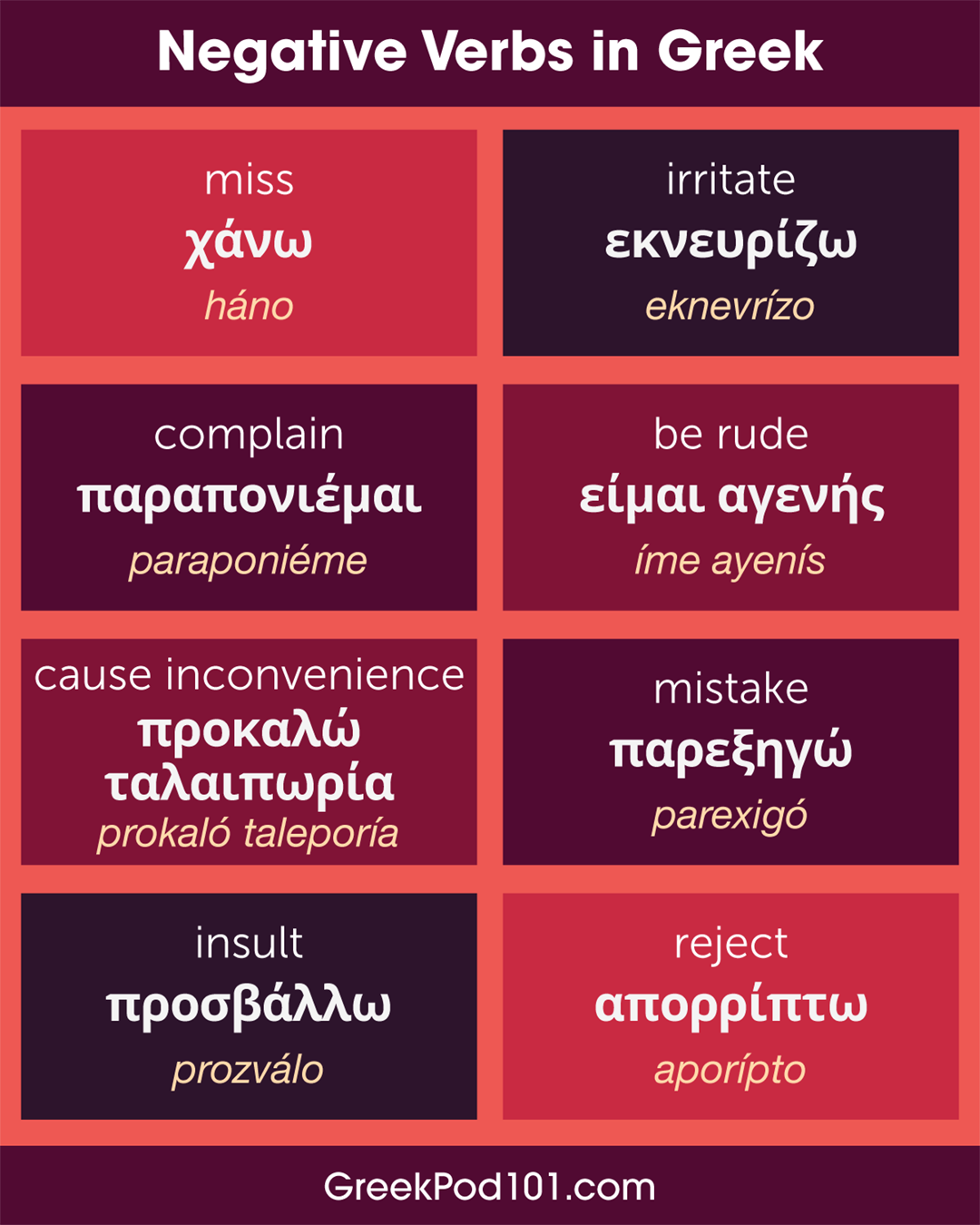
When it comes to Greek verbs, many people focus only on the grammar aspect, neglecting to really expand their vocabulary.
In this blog post, we aim to provide you with the top 100 most essential Greek verbs. In order to achieve this, we’ve divided the verbs into meaningful categories and have provided an example of how to use each one.
This is your ultimate guide to the huge variety of Greek verbs!
 Table of Contents
Table of Contents
- An Introduction to Greek Verbs Usage
- Greek Verbs of Motion
- Sport-Related Verbs
- Verbs of Communication
- Study-Related Verbs
- Verbs of the Mind
- Verbs of Sentiments
- Auxiliary Verbs
- Linking (or Copular) Verbs
- Conclusion
1. An Introduction to Greek Verbs Usage

From a grammar perspective, Greek verbs present two major conjugations: Conjugation A and Conjugation B.
Conjugation A includes verbs ending in:
- -ω | Active Voice
- -ομαι | Passive Voice
e.g. λύν-ω / λύν-ομαι
Conjugation B includes verbs ending in:
- -ώ | Active Voice
- -ιέμαι / – ούμαι | Passive Voice
e.g. αγαπ-ώ / αγαπ-ιέμαι | θεωρώ / θεωρ-ούμαι
In order to understand the Greek verb conjugation rules in depth, you can take a look at our relevant article.
From a syntax perspective, Greek verbs are placed similarly to how they are in English syntax, following the SVO (Subject – Verb – Object) rule. However, what intrigues most students is that the subject may be omitted, especially if it’s a personal pronoun. This phenomenon is very common in the Greek language since the suffix of the verb usually reveals the subject.
In the examples demonstrated below, you’ll be able to familiarize yourself with Greek language verb conjugation, as well as the syntax of each sentence.
2. Greek Verbs of Motion

| 1 | Greek: πηγαίνω Romanization: piyéno Translation: “to go” | Example: Greek: Κάθε μέρα πηγαίνω στη δουλειά. Romanization: Káthe méra piyéno sti duliá. Translation: “Every day, I go to work.” |
| 2 | Greek: παίρνω Romanization: pérno Translation: “to get” / “to take” | Example: Greek: Παίρνω παντού το κινητό μου μαζί μου. Romanization: Pérno padú to kinitó mu mazí mu. Translation: “I take my mobile phone everywhere with me.” |
| 3 | Greek: φτιάχνω Romanization: ftiáhno Translation: “to make” | Example: Greek: Η μητέρα μου φτιάχνει τυρόπιτα. Romanization: I mitéra mu ftiáhni tirópita. Translation: “My mother is making cheese pie.” |
| 4 | Greek: κάνω Romanization: káno Translation: “to do” | Example: Greek: Θα κάνω ό,τι μου πεις. Romanization: Tha káno ó,ti mu pis. Translation: “I will do whatever you tell me.” |
| 5 | Greek: δουλεύω Romanization: dulévo Translation: “to work” | Example: Greek: Συνήθως δουλεύω πέντε ημέρες την εβδομάδα. Romanization: Siníthos dulévo pénde iméres tin evdomáda. Translation: “Normally, I work five days per week.” |
| 6 | Greek: βάζω Romanization: vázo Translation: “to put” | Example: Greek: Βάλε το παγωτό στην κατάψυξη. Romanization: Vále to pagotó stin katápsixi. Translation: “Put the ice cream in the freezer.” |
| 7 | Greek: βοηθώ Romanization: voithó Translation: “to help” | Example: Greek: Μπορείς να με βοηθήσεις λίγο; Romanization: Borís na me voithísis lígo? Translation: “Could you help me a bit?” |
| 8 | Greek: μετακινώ Romanization: metakinó Translation: “to move something” | Example: Greek: Αν μετακινήσουμε λίγο το τραπέζι, θα υπάρχει περισσότερος χώρος. Romanization: An metakinísume lígo to trapézi, tha ipárhi perisóteros hóros. Translation: “If we move the table a bit, there will be more space.” |
| 9 | Greek: ακολουθώ Romanization: akoluthó Translation: “to follow” | Example: Greek: Παρακαλώ ακολουθήστε με, για να σας δείξω το δωμάτιό σας. Romanization: Parakaló akoluthíste me, ya na sas díxo to domátió sas. Translation: “Please follow me so I can show you your room.” |
| 10 | Greek: αλλάζω Romanization: alázo Translation: “to change” | Example: Greek: Ο καιρός άλλαξε πολύ γρήγορα. Romanization: O kerós álaxe polí grígora. Translation: “The weather changed very quickly.” |
| 11 | Greek: ψάχνω Romanization: psáhno Translation: “to search” / “to look for” | Example: Greek: Αυτό που ψάχνω είναι καλά κρυμμένο. Romanization: Aftó pu psáhno íne kalá kriméno. Translation: “What I am looking for is well-hidden.” |
| 12 | Greek: οργανώνω Romanization: organóno Translation: “to organize” | Example: Greek: Οργάνωσα τα ρούχα στην ντουλάπα μου. Romanization: Orgánosa ta rúha stin dulápa mu. Translation: “I organized the clothes in my wardrobe.” |
| 13 | Greek: πιάνω Romanization: piáno Translation: “to catch” / “to grip” | Example: Greek: Πιάσε με, αν μπορείς! Romanization: Piáse me, an borís! Translation: “Catch me if you can!” |
| 14 | Greek: ακουμπάω / ακουμπώ Romanization: akumbáo / akumbó Translation: “to touch” | Example: Greek: Δεν μου αρέσει να με ακουμπάνε. Romanization: Den mu arési na me akumbáne. Translation: “I don’t like to be touched.” |
| 15 | Greek: κάθομαι Romanization: káthome Translation: “to sit” | Example: Greek: Στον κινηματογράφο μου αρέσει να κάθομαι στην τελευταία σειρά. Romanization: Ston kinimatográfo mu arési na káthome stin teleftéa sirá. Translation: “At the cinema, I like to sit in the last row.” |
| 16 | Greek: σηκώνομαι Romanization: sikónome Translation: “to get/stand up” | Example: Greek: Τώρα θα σηκωθώ, για να πάω για τρέξιμο. Romanization: Τóra tha sikothó, ya na páo ya tréximo. Translation: “Now I will get up in order to go running.” |
| 17 | Greek: ανοίγω Romanization: anígo Translation: “to open” | Example: Greek: Μπορείς να ανοίξεις το παράθυρο, σε παρακαλώ; Romanization: Borís na aníxis to paráthiro, se parakaló? Translation: “Can you open the window, please?” |
| 18 | Greek: κλείνω Romanization: klíno Translation: “to close” | Example: Greek: Μπορείς να κλείσεις την πόρτα, σε παρακαλώ; Romanization: Borís na klísis tin pórta, se parakaló? Translation: “Can you close the door, please?” |
| 19 | Greek: κόβω Romanization: kóvo Translation: “to cut” | Example: Greek: Όταν μαγειρεύω, κόβω τα λαχανικά σε μικρά κομμάτια. Romanization: Ótan mayirévo, kóvo ta lahaniká se mikrá komátia. Translation: “When I cook, I cut the vegetables into small pieces.” |
| 20 | Greek: κουβαλάω / κουβαλώ Romanization: kuvaláo / kuvaló Translation: “to carry” | Example: Greek: Αυτό είναι πολύ βαρύ. Θα με βοηθήσεις να το κουβαλήσουμε; Romanization: Aftó íne polí varí. Tha me voithísis na to kuvalísume? Translation: “This is too heavy. Will you help me carry it?” |
| 21 | Greek: κρατώ Romanization: krató Translation: “to hold” / “to keep” | Example: Greek: Το παιδί κρατούσε σφιχτά το χέρι της μητέρας του. Romanization: To pedí kratúse sfihtá to héri tis mitéras tu. Translation: “The kid was holding tight to his mother’s hand.” |
| 22 | Greek: πατάω / πατώ Romanization: patáo / pató Translation: “to press” | Example: Greek: Πατήστε οποιοδήποτε κουμπί, για να συνεχίσετε. Romanization: Patíste opiodípote kubí, ya na sinehísete. Translation: “Press any button to continue.” |
| 23 | Greek: πέφτω Romanization: péfto Translation: “to fall” | Example: Greek: Αν πέσεις από εκεί, θα τραυματιστείς. Romanization: An pésis apó ekí, tha travmatistís. Translation: “If you fall from there, you’ll get injured.” |
| 24 | Greek: τρώω Romanization: tróo Translation: “to eat” | Example: Greek: Από κρέας τρώω μόνο κοτόπουλο. Romanization: Apó kréas tróo móno kotópulo. Translation: “As for meat, I only eat chicken.” |
| 25 | Greek: πίνω Romanization: píno Translation: “to drink” | Example: Greek: Δεν πίνω αλκοόλ. Romanization: Den píno alkoól. Translation: “I don’t drink alcohol.” |
3. Sport-Related Verbs

| 26 | Greek: περπατάω / περπατώ Romanization: perpatáo / perpató Translation: “to walk” | Example: Greek: Στόχος μου είναι να περπατώ για τουλάχιστον δύο χιλιόμετρα κάθε μέρα. Romanization: Stóhos mu íne na perpató ya tuláhiston dío hiliómetra káthe méra. Translation: “My goal is to walk for at least two kilometers every day.” |
| 27 | Greek: τρέχω Romanization: trého Translation: “to run” | Example: Greek: Μου αρέσει να τρέχω στην εξοχή. Romanization: Mu arési na trého stin exohí. Translation: “I like running in the countryside.” |
| 28 | Greek: πηδάω / πηδώ Romanization: pidáo / pidó Translation: “to jump” | Example: Greek: Ο αθλητής πηδούσε τα εμπόδια με ευκολία. Romanization: O athlitís pidúse ta embódia me efkolía. Translation: “The athlete was jumping over the obstacles with ease.” |
| 29 | Greek: παίζω Romanization: pézo Translation: “to play” | Example: Greek: Ο γιος μου μπορεί να παίζει ποδόσφαιρο όλη μέρα. Romanization: O yos mu borí na pézi podósfero óli méra. Translation: “My son could play football all day long.” |
| 30 | Greek: σκαρφαλώνω Romanization: skarfalóno Translation: “to climb” | Example: Greek: Όταν ήμουν μικρός, μου άρεσε να σκαρφαλώνω σε δέντρα. Romanization: Ótan ímun mikrós, mu árese na skarfalóno se dédra. Translation: “When I was young, I used to like climbing on trees.” |
| 31 | Greek: κολυμπάω / κολυμπώ Romanization: kolimbáo / kolimbó Translation: “to swim” | Example: Greek: Το καλοκαίρι κολυμπάω στη θάλασσα κάθε μέρα. Romanization: To kalokéri kolimbáo sti thálasa káthe méra. Translation: “During the summer, I swim in the sea every day.” |
| 32 | Greek: αθλούμαι Romanization: athlúme Translation: “to exercise” | Example: Greek: Αθλούμαι καθημερινά, για να διατηρούμαι σε φόρμα. Romanization: Athlúme kathimeriná, ya na diatirúme se fórma. Translation: “I exercise everyday in order to stay fit.” |
| 33 | Greek: κερδίζω Romanization: kerdízo Translation: “to win” | Example: Greek: Η ομάδα που θα κερδίσει θα περάσει στον τελικό. Romanization: I omáda pu tha kerdísi tha perási ston telikó. Translation: “The team that wins will proceed to the finals.” |
| 34 | Greek: χάνω Romanization: háno Translation: “to lose” | Example: Greek: Η ομάδα που θα χάσει θα αποκλειστεί. Romanization: I omáda pu tha hási tha apoklistí. Translation: “The team that loses will be eliminated.” |
4. Verbs of Communication

| 35 | Greek: επικοινωνώ Romanization: epikinonó Translation: “to communicate” | Example: Greek: Η δουλειά μου είναι να επικοινωνώ καθημερινά με πελάτες. Romanization: I duliá mu íne na epikinonó kathimeriná me pelátes. Translation: “My job is to communicate with customers daily.” |
| 36 | Greek: λέω Romanization: léo Translation: “to tell” | Example: Greek: Πάντα λέω αυτό που σκέφτομαι. Romanization: Pánda léo aftó pu skéftome. Translation: “I always say what I am thinking.” |
| 37 | Greek: μιλάω / μιλώ Romanization: miláo / miló Translation: “to talk” | Example: Greek: Πρέπει να μιλήσουμε. Romanization: Prépi na milísume. Translation: “We need to talk.” |
| 38 | Greek: ρωτάω / ρωτώ Romanization: rotáo / rotó Translation: “to ask” | Example: Greek: Αν δεν καταλαβαίνεις κάτι, απλώς ρώτα με. Romanization: An den katalavénis káti, aplós róta me. Translation: “If you don’t understand something, just ask me.” |
| 39 | Greek: συζητάω / συζητώ Romanization: sizitáo / sizitó Translation: “to discuss” | Example: Greek: Θα πρέπει να συζητάμε όλα τα προβλήματα και να βρίσκουμε λύσεις. Romanization: Tha prépi na sizitáme óla ta provlímata ke na vrískume lísis. Translation: “We will have to discuss all problems and find solutions.” |
| 40 | Greek: φωνάζω Romanization: fonázo Translation: “to yell” | Example: Greek: Δεν χρειάζεται να φωνάζεις. Το κατάλαβα. Romanization: Den hriázete na fonázis. To katálava. Translation: “There’s no need to yell. I got it.” |
| 41 | Greek: ανακοινώνω Romanization: anakinóno Translation: “to announce” | Example: Greek: Θα θέλαμε να σας ανακοινώσουμε ότι παντρευόμαστε. Romanization: Tha thélame na sas anakinósume óti pandrevómaste. Translation: “We would like to announce that we’re getting married.” |
| 42 | Greek: απαντάω / απαντώ Romanization: apandáo / apandó Translation: “to reply” / “to answer” | Example: Greek: Θα σας απαντήσω το συντομότερο δυνατόν. Romanization: Tha sas apandíso to sindomótero dinatón. Translation: “I will answer you as soon as possible.” |
| 43 | Greek: παρουσιάζω Romanization: parusiázo Translation: “to present” | Example: Greek: Σας παρουσιάζω τα αποτελέσματα της έρευνάς μου. Romanization: Sas parusiázo ta apotelézmata tis érevnás mu. Translation: “I am presenting you with the results of my research.” |
| 44 | Greek: ενημερώνω Romanization: enimeróno Translation: “to inform” | Example: Greek: Θα ήθελα να σας ενημερώσω ότι θα είμαι σε επαγγελματικό ταξίδι την επόμενη εβδομάδα. Romanization: Tha íthela na sas enimeróso óti tha íme se epangelmatikó taxídi tin epómeni evdomáda. Translation: “I would like to inform you that I will be on a business trip next week.” |
| 45 | Greek: καλώ Romanization: kaló Translation: “to call” | Example: Greek: Εάν έχετε οποιαδήποτε απορία, καλέστε μας στο +30 2101234567. Romanization: Eán éhete opiadípote aporía, kaléste mas sto +30 2101234567. Translation: “If you have any questions, call us at +30 2101234567.” |
5. Study-Related Verbs

| 46 | Greek: διαβάζω Romanization: diavázo Translation: “to read” | Example: Greek: Διαβάστε το κείμενο πολλές φορές πριν απαντήσετε τις ερωτήσεις. Romanization: Diaváste to kímeno polés forés prin apandísete tis erotísis. Translation: “Read the text many times before you answer the questions.” |
| 47 | Greek: διδάσκω Romanization: didásko Translation: “to teach” | Example: Greek: Η κυρία Άννα διδάσκει ελληνικά. Romanization: I kiría Ánna didáski eliniká. Translation: “Mrs. Anna teaches Greek.” |
| 48 | Greek: μαθαίνω Romanization: mathéno Translation: “to learn” | Example: Greek: Μου αρέσει να μαθαίνω ξένες γλώσσες. Romanization: Mu arési na mathéno xénes glóses. Translation: “I like learning foreign languages.” |
| 49 | Greek: μελετάω / μελετώ Romanization: meletáo / meletó Translation: “to study” | Example: Greek: Μελετάω τουλάχιστον δύο ώρες κάθε μέρα. Romanization: Meletáo tuláhiston dío óres káthe méra. Translation: “I study at least two hours per day.” |
| 50 | Greek: γράφω Romanization: gráfo Translation: “to write” | Example: Greek: Αυτήν τη φορά γράφω ένα μυθιστόρημα. Romanization: Aftín ti forá gráfo éna mithistórima. Translation: “This time I am writing a novel.” |
| 51 | Greek: σβήνω Romanization: zvíno Translation: “to erase” / “to delete” | Example: Greek: Έσβησα όλη την άσκηση, γιατί δεν ήταν σωστή. Romanization: Ézvisa óli tin áskisi, yatí den ítan sostí. Translation: “I erased the whole exercise because it was not correct.” |
| 52 | Greek: διορθώνω Romanization: diorthóno Translation: “to correct” | Example: Greek: Πρέπει να διορθώσεις τα λάθη σου. Romanization: Prépi na diorthósis ta láthi su. Translation: “You must correct your mistakes.” |
| 53 | Greek: λύνω Romanization: líno Translation: “to solve” / “to untie” | Example: Greek: Πρέπει να λύσεις όλες τις ασκήσεις σου. Romanization: Prépi na lísis óles tis askísis su. Translation: “You should solve all your exercises.” |
| 54 | Greek: αποστηθίζω Romanization: apostithízo Translation: “to learn by heart” / “memorize” | Example: Greek: Πρέπει να αποστηθίσεις τα πιο σημαντικά κομμάτια. Romanization: Prépi na apostithísis ta pio simandiká komátia . Translation: “You should memorize the most important parts.” |
| 55 | Greek: βελτιώνω / βελτιώνομαι Romanization: veltióno / veltiónome Translation: “to improve” / “to be improved” | Example: Greek: Χαίρομαι που βελτιώνεσαι μέρα με τη μέρα. Romanization: Hérome pu veltiónese méra me ti méra. Translation: “I am glad you are improving day by day.” |
| 56 | Greek: εκτυπώνω Romanization: ektipóno Translation: “to print” | Example: Greek: Θα ήθελα να εκτυπώσω αυτές τις δύο σελίδες. Romanization: Tha íthela na ektipóso aftés tis dío selídes. Translation: “I would like to print these two pages.” |
| 57 | Greek: αξιολογώ / αξιολογούμαι Romanization: axiologó / axiologúme Translation: “to assess” / “to be assessed” | Example: Greek: Θα αξιολογηθείτε μέχρι το τέλος του μαθήματος. Romanization: Tha axioloyithíte méhri to télos tu mathímatos. Translation: “You will be assessed by the end of the lesson.” |
6. Verbs of the Mind

| 58 | Greek: σκέφτομαι Romanization: skéftome Translation: “to think” / “to consider” | Example: Greek: Σκέφτομαι να τα παρατήσω. Romanization: Skéftome na ta paratíso. Translation: “I am thinking about quitting.” |
| 59 | Greek: νομίζω Romanization: nomízo Translation: “to think” | Example: Greek: Νομίζω πως έχεις δίκιο. Romanization: Nomízo pos éhis díkio. Translation: “I think you are right.” |
| 60 | Greek: πιστεύω Romanization: pistévo Translation: “to believe” | Example: Greek: Πιστεύω στον Θεό. Romanization: Pistévo ston Theó. Translation: “I believe in God.” |
| 61 | Greek: αισθάνομαι Romanization: esthánome Translation: “to feel” | Example: Greek: Αισθάνομαι λίγο ζαλισμένος. Romanization: Esthánome lígo zalizménos. Translation: “I feel a bit dizzy.” |
| 62 | Greek: ξέρω / γνωρίζω Romanization: xéro / gnorízo Translation: “to know” | Example: Greek: Το ξέρω ότι είσαι κουρασμένος. Romanization: To xéro óti íse kurazménos. Translation: “I know you are tired.” |
| 63 | Greek: θέλω Romanization: thélo Translation: “to want” | Example: Greek: Θέλω να πάμε διακοπές στην Ελλάδα. Romanization: Thélo na páme diakopés stin Eláda. Translation: “I want us to go for vacation in Greece.” |
| 64 | Greek: αμφισβητώ Romanization: amfizvitó Translation: “to doubt” | Example: Greek: Το ξέρω ότι έχεις δίκιο. Δεν το αμφισβητώ. Romanization: To xélo óti éhis díkio. Den to amfizvitó. Translation: “I know you are right. I don’t doubt this.” |
| 65 | Greek: καταλαβαίνω Romanization: katalavéno Translation: “to understand” | Example: Greek: Σε παρακαλώ, μίλα αργά, για να σε καταλαβαίνω. Romanization: Se parakaló, míla argá, ya na se katalavéno. Translation: “Please, talk slowly so I can understand you.” |
| 66 | Greek: θυμάμαι Romanization: thimáme Translation: “to remember” | Example: Greek: Θυμάσαι εκείνο το ξενοδοχείο στη Μύκονο; Romanization: Thimáse ekíno to xenodohío sti Míkono? Translation: “Do you remember that hotel in Mykonos?” |
| 67 | Greek: ξεχνάω / ξεχνώ Romanization: xehnáo / xehnó Translation: “to forget” | Example: Greek: Ξέχασα να κάνω εκείνη την άσκηση. Romanization: Xéhasa na káno ekíni tin áskisi. Translation: “I forgot to do that exercise.” |
7. Verbs of Sentiments

| 68 | Greek: αγαπάω / αγαπώ Romanization: agapáo / agapó Translation: “to love” | Example: Greek: Σε αγαπώ πολύ. Romanization: Se agapó polí. Translation: “I love you very much.” |
| 69 | Greek: λατρεύω Romanization: latrévo Translation: “to adore” | Example: Greek: Σε λατρεύω. Romanization: Se latrévo. Translation: “I adore you.” |
| 70 | Greek: θαυμάζω Romanization: thavmázo Translation: “to admire” | Example: Greek: Θαυμάζω τον δάσκαλό μου για την υπομονή του. Romanization: Thavmázo ton dáskaló mu ya tin ipomoní tu. Translation: “I admire my teacher for his patience.” |
| 71 | Greek: φοβάμαι Romanization: fováme Translation: “to be afraid” | Example: Greek: Φοβάμαι μην σε χάσω. Romanization: Fováme min se háso. Translation: “I am afraid to lose you.” |
| 72 | Greek: μισώ Romanization: misó Translation: “to hate” | Example: Greek: Μισώ όλα όσα τον θυμίζουν. Romanization: Misó óla ósa ton thimízun. Translation: “I hate everything that reminds me of him.” |
| 73 | Greek: λυπάμαι Romanization: lipáme Translation: “to be sorry” | Example: Greek: Λυπάμαι γι’ αυτό που σου συνέβη. Romanization: Lipáme yi’ aftó pu su sinévi. Translation: “I am sorry for what happened to you.” |
| 74 | Greek: δακρύζω Romanization: dakrízo Translation: “to tear up” | Example: Greek: Αυτή η ταινία με έκανε να δακρύσω λίγο. Romanization: Aftí i tenía me ékane na dakríso lígo. Translation: “This movie made me tear up a bit.” |
| 75 | Greek: κλαίω Romanization: kléo Translation: “to cry” | Example: Greek: Όσο μεγαλώνουμε, κλαίμε όλο και πιο σπάνια. Romanization: Óso megalónume, kléme ólo ke pio spánia. Translation: “As we grow up, we cry less and less.” |
| 76 | Greek: στεναχωριέμαι Romanization: stenahoriéme Translation: “to be sad” | Example: Greek: Μην στεναχωριέσαι. Όλα θα πάνε καλά. Romanization: Min stenahoriése. Óla tha páne kalá. Translation: “Don’t be sad. Everything’s going to be alright.” |
| 77 | Greek: χαίρομαι Romanization: hérome Translation: “to be happy” | Example: Greek: Χάρηκα πολύ που πήρες προαγωγή. Romanization: Hárika polí pu píres proagoyí. Translation: “I am very happy that you got promoted.” |
| 78 | Greek: απολαμβάνω Romanization: apolamváno Translation: “to enjoy” | Example: Greek: Το καλοκαίρι απολαμβάνω τη θάλασσα. Romanization: To kalokéri apolamváno ti thálasa. Translation: “During the summer, I enjoy the sea.” |
| 79 | Greek: γοητεύω Romanization: goitévo Translation: “to charm” / “to fascinate” | Example: Greek: Αυτή η γυναίκα με γοήτευσε. Romanization: Aftí i yinéka me goítefse. Translation: “This woman fascinated me.” |
| 80 | Greek: απογοητεύω / απογοητεύομαι Romanization: apogoitévo / apogoitévome Translation: “to disappoint” / “to be disappointed” | Example: Greek: Μην απογοητεύεσαι. Μπορείς πάντα να ξαναπροσπαθήσεις. Romanization: Min apogoitévese. Borís pánda na xanaprospathísis, Translation: “Don’t be disappointed. You can always try again.” |
| 81 | Greek: γελάω / γελώ Romanization: yeláo / yeló Translation: “to laugh” | Example: Greek: Γέλασα πολύ με αυτήν την κωμωδία. Romanization: Yélasa polí me aftín tin komodía. Translation: “I laughed a lot with this comedy.” |
| 82 | Greek: χαμογελάω / χαμογελώ Romanization: hamoyeláo / hamoyeló Translation: “to smile” | Example: Greek: Χαμογελάω πάντα το πρωί στον καθρέφτη και γεμίζω με θετική ενέργεια. Romanization: Hamoyeláo pánda to proí ston kathréfti ke yemízo me thetikí enéryia. Translation: “I always smile at the mirror in the morning and I get charged with positive energy.” |
| 83 | Greek: θυμώνω Romanization: thimóno Translation: “to get angry” | Example: Greek: Ο πατέρας μου θυμώνει πολύ εύκολα. Romanization: O patéras mu thimóni polí éfkola. Translation: “My father gets angry very easily.” |
8. Auxiliary Verbs
There are only two Greek auxiliary verbs: έχω (ého), meaning “to have,” and είμαι (íme), meaning “to be.” They’re called “auxiliary” because apart from their individual use, they can help (hence the term “auxiliary”) form various Greek verb forms. More specifically, the verb έχω (ého) can also be used as a formation element of verbs in the perfect tenses, while είμαι (íme) can also be used before a passive voice participle to form various verb forms.
| 84 | Greek: έχω Romanization: ého Translation: “to have” | Example: Greek: Θα έχω τελειώσει τα μαθήματά μου μέχρι τότε. Romanization: Tha ého teliósi ta mathímatá mu méhri tóte. Translation: “I will have finished my homework by then.” |
| 85 | Greek: είμαι Romanization: íme Translation: “to be” | Example: Greek: Είμαι ικανοποιημένος με το αποτέλεσμα. Romanization: Íme ikanopiiménos me to apotélezma. Translation: “I am satisfied with the result.” |
9. Linking (or Copular) Verbs

A linking verb connects the subject or the object with a word or phrase that gives more information
about it. The verb είμαι (íme), meaning “to be,” that we saw above as an auxiliary verb, is also a linking verb.
| Greek: είμαι Romanization: íme Translation: “to be” | Example: Greek: Είναι πολύ όμορφος. Romanization: Íne polí ómorfos. Translation: “He is very handsome.” |
Some groups of linking verbs are:
9.1 Verbs of Existence
| 86 | Greek: γίνομαι Romanization: yínome Translation: “to become” | Example: Greek: Γίνομαι όλο και πιο οργανωμένος όσο περνά ο καιρός. Romanization: Yínome ólo ke pio organoménos óso perná o kerós. Translation: “I am becoming more and more organized as time passes by.” |
| 87 | Greek: γεννιέμαι Romanization: yeniéme Translation: “to be born” | Example: Greek: Γεννήθηκα έτοιμος γι’ αυτό. Romanization: Yeníthika étimos yi’ aftó. Translation: “I was born ready for this.” |
| 88 | Greek: υπάρχω Romanization: ipárho Translation: “to exist” / “(to happen) to be” | Example: Greek: Υπήρξα απρόσεκτος στο παρελθόν. Romanization: Ipírxa aprósektos sto parelthón. Translation: “I happened to be/was careless in the past.” |
| 89 | Greek: στέκομαι Romanization: stékome Translation: “to stand up” (literally) / “(to happen) to be” (secondary meaning, usually in the past tense) | Example: Greek: Στάθηκα τυχερός κατά το παρελθόν. Romanization: Státhika tiherós katá to parelthón. Translation: “I happened to be/was lucky in the past.” |
9.2 Verbs of Reckoning
| 90 | Greek: φαίνομαι Romanization: fénome Translation: “to look” / “to seem | Example: Greek: Φαίνεται έξυπνος, αλλά μερικές φορές κάνει τον χαζό. Romanization: Fénete éxipnos, alá merikés forés káni ton hazó. Translation: “He seems to be smart, but sometimes he acts dumb.” |
| 91 | Greek: θεωρούμαι Romanization: theorúme Translation: “to be considered (as)” | Example: Greek: Θεωρείται έξυπνος, αλλά στην ουσία δεν είναι. Romanization: Theoríte éxipnos, allá stin usía den íne. Translation: “Ηe is considered to be smart, but in reality he is not.” |
9.3 Verbs of Reference
| 92 | Greek: βρίσκομαι Romanization: vrískome Translation: “to be located” / “to be” | Example: Greek: Βρίσκομαι στο αεροδρόμιο αυτήν τη στιγμή. Romanization: Vrískome sto aerodrómio aftín ti stigmí. Translation: “I am at the airport right now.” |
| 93 | Greek: μοιάζω Romanization: miázo Translation: “to look like” / “to seem to be” | Example: Greek: Μοιάζεις πολύ με τον μπαμπά σου. Romanization: Miázis polí me ton babá su. Translation: “You look a lot like your father.” |
| 94 | Greek: αποδεικνύομαι Romanization: apodikníome Translation: “to prove to be” | Example: Greek: Η άσκηση που έλυσα αποδείχθηκε λάθος. Romanization: I áskisi pu élisa apodíhthike láthos. Translation: “The exercise I solved was proven to be wrong.” |
9.4 Vocative Verbs
| 95 | Greek: λέγομαι Romanization: légome Translation: “to be said/called” | Example: Greek: Πώς λέγεσαι; Romanization: Pós léyese? Translation: “What’s your name?” (lit. “How are you called?”) |
| 96 | Greek: ονομάζω / ονομάζομαι Romanization: onomázo / onomázome Translation: “to name” / “to be named” (= “my name is”) | Example: Greek: Ονομάζομαι Γιώργος. Εσένα πώς σε λένε; Romanization: Onomázome Yórgos. Eséna pós se léne? Translation: “My name is George. What’s your name?” |
| 97 | Greek: καλώ / καλούμαι Romanization: kaló / kalúme Translation: “to call” / “to be called” | Example: Greek: Aν συνεχίσετε τη φασαρία, θα καλέσω την αστυνομία! Romanization: An sinehísete ti fasaría, tha kaléso tin astinomía! Translation: “If you continue this racket, I’m going to call the police!” |
9.5 Verbs of Election
| 98 | Greek: διορίζω / διορίζομαι Romanization: diorízo / diorízome Translation: “to appoint” / “to be appointed” | Example: Greek: Διορίστηκε δάσκαλος σε ένα μικρό ελληνικό νησί. Romanization: Diorístike dáskalos se éna mikró elinikó nisí. Translation: “He was appointed teacher on a small Greek island.” |
| 99 | Greek: εκλέγω / εκλέγομαι Romanization: eklégo / eklégome Translation: “to elect” / “to be elected” | Example: Greek: Εκλέχθηκε δήμαρχος της πόλης. Romanization: Ekléhthike dímarhos tis pólis. Translation: “He was elected mayor of the city.” |
| 100 | Greek: κρίνομαι Romanization: krínome Translation: “to be deemed” | Example: Greek: Το κτίριο κρίθηκε μη ασφαλές μετά τον σεισμό. Romanization: To ktírio kríthike mi asfalés metá ton sizmó. Translation: “The building was deemed unsafe after the earthquake.” |
10. Conclusion
This was just the beginning: A comprehensive guide for the top 100 most essential Greek verbs.
There’s still a lot to learn after you memorize this Greek verbs list. If you feel ready to dig into Greek verbs a little bit more, check out our article about how to conjugate Greek verbs that we linked to earlier. Otherwise, we encourage you to read our Top 100 Nouns and Top 100 Adjectives articles, which will be quite useful in expanding your vocabulary.
In the meantime, is there a verb that troubles you or a Greek verb we didn’t mention?
Let us know in the comments section below!
On GreekPod101.com, we aim to provide you with everything you need to know about the Greek language in a fun and interesting way. Articles like this one, word lists, grammar tips, and even YouTube videos are waiting for you to discover them! And if you prefer a one-on-one learning experience, you can use our MyTeacher Messenger before heading over to our online community to discuss lessons with other students.
It’s easy, too! Start your free, lifetime account today.










